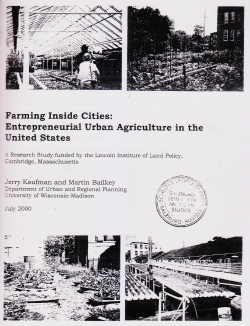Farming inside cities: Entrepreneurial Urban Agriculture in the United States

Book Stores
Type
Book
Category
Publication Year
2000
Publisher
Pages
103
Subject
Urban Farming; Urban Agriculture
Abstract
Most people think of farming as an activity occurring almost exclusively on rural land, This report, however, takes a look at cities in the United States-especially those affected more substantially by economic changes and population losses over the past several decades - as a new and unconventional locus for for-market farming ventures. The setting for food growing in these cities is the abundant vacant cities to the suburbs.
The report investigates the nature and characteristics of for-market city farming, obstacles to such activities, and ways of overcoming these obstacles. It also offers proponents of urban agriculture suggestions to advance the cause of city farming in environments where may are either uninformed of the multiple benefits of entrepreneurial urban agriculture, if they so choose, are also targets for suggestions on ways they could be more proactive in support of city farming.
More than 120 people served as informants for this study. Some 70 entrepreneurial urban agriculture projects in United States cities were found. The initiators of these projects are a very diverse group - community garden organizations, community development corporations, neighborhood organizations, inner-city high schools, social service organizations, church- affiliated groups, youth service agencies, farmers with a special interest in in-city food production, university extension services, animal husbandry organizations, homeless agencies, public housing tenants, and private sector businesses. Just as the sponsors of for-market urban agriculture ventures varied, there were differences among the projects across several important dimensions, such as the form of urban agriculture practiced, sources of funding, resource capacities of the responsible organizations, staffing arrangements, scale of operations, types of production techniques used, market outlet, and locations. Detailed case studies of Boston, Chicago, and Philadelphia probed the institutional climate for urban agriculture and investigated fifteen for-market urban agriculture projects in these cities.
The study found both supporters and skeptics of entrepreneurial urban agriculture. Obstacles to such activities were generated from the interviews conducted. These are discussed under four broad categories - sire-related, government-related, procedure-related and perception-related. Among the more prominent obstacles mentioned were site contamination, site vandalism, government and non-profit community development group skepticism, inadequate financing and staffing problems. Ways of overcoming these obstacles are discussed, premised on the possibility that governments at all levels, local and national philanthropic foundations, and community development corporations can offer stronger support for entrepreneurial urban agriculture. Actions that specific groups could initiate to be more proactive towards the nascent movement of for-market urban agriculture are presented.
The report investigates the nature and characteristics of for-market city farming, obstacles to such activities, and ways of overcoming these obstacles. It also offers proponents of urban agriculture suggestions to advance the cause of city farming in environments where may are either uninformed of the multiple benefits of entrepreneurial urban agriculture, if they so choose, are also targets for suggestions on ways they could be more proactive in support of city farming.
More than 120 people served as informants for this study. Some 70 entrepreneurial urban agriculture projects in United States cities were found. The initiators of these projects are a very diverse group - community garden organizations, community development corporations, neighborhood organizations, inner-city high schools, social service organizations, church- affiliated groups, youth service agencies, farmers with a special interest in in-city food production, university extension services, animal husbandry organizations, homeless agencies, public housing tenants, and private sector businesses. Just as the sponsors of for-market urban agriculture ventures varied, there were differences among the projects across several important dimensions, such as the form of urban agriculture practiced, sources of funding, resource capacities of the responsible organizations, staffing arrangements, scale of operations, types of production techniques used, market outlet, and locations. Detailed case studies of Boston, Chicago, and Philadelphia probed the institutional climate for urban agriculture and investigated fifteen for-market urban agriculture projects in these cities.
The study found both supporters and skeptics of entrepreneurial urban agriculture. Obstacles to such activities were generated from the interviews conducted. These are discussed under four broad categories - sire-related, government-related, procedure-related and perception-related. Among the more prominent obstacles mentioned were site contamination, site vandalism, government and non-profit community development group skepticism, inadequate financing and staffing problems. Ways of overcoming these obstacles are discussed, premised on the possibility that governments at all levels, local and national philanthropic foundations, and community development corporations can offer stronger support for entrepreneurial urban agriculture. Actions that specific groups could initiate to be more proactive towards the nascent movement of for-market urban agriculture are presented.
Number of Copies
1
| Library | Accession No | Call No | Copy No | Edition | Location | Availability |
|---|---|---|---|---|---|---|
| Main | 1320 | HD 256 K38 2000 | 1 | Yes |




